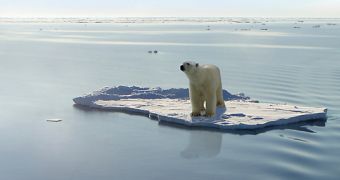Ocean acidification is something most people are all too familiar with. The principles behind this phenomenon are pretty straightforward: atmospheric carbon gets absorbed by the water, the latter's chemistry changes, marine wildlife are not very happy about it.
According to Inhabitat, several researchers now warn that, as far as they can tell, Arctic seas are presently experiencing a rapid process of acidification.
This is because climate change causes their protective ice cap to melt ever more during the summer months.
As the specialists explain, this new melting pattern of the ice cap in this part of the world translates into wider areas of sea surface becoming exposed to the air.
Once this happens, increased amounts of atmospheric carbon get to creep into the Nordic seas.
“The sea ice has been a lid on the Arctic, so the loss of ice is allowing fast uptake of CO2,” lead researcher Richard Bellerby reportedly told members of the press.
Both conservationists and wildlife researchers fear that, as Arctic seas take in more carbon, aquatic ecosystems will be negatively affected by the changes taking place in local water chemistry.

 14 DAY TRIAL //
14 DAY TRIAL //